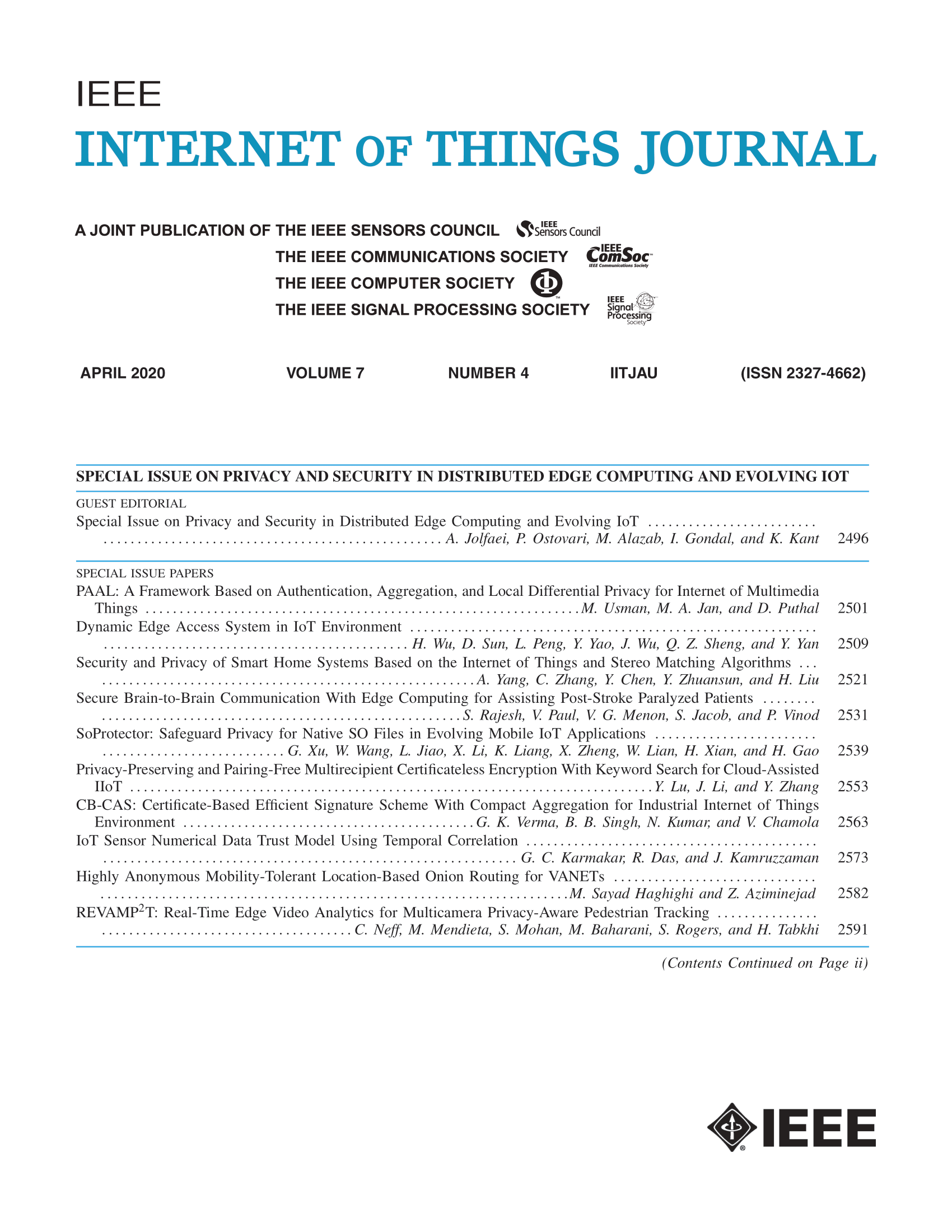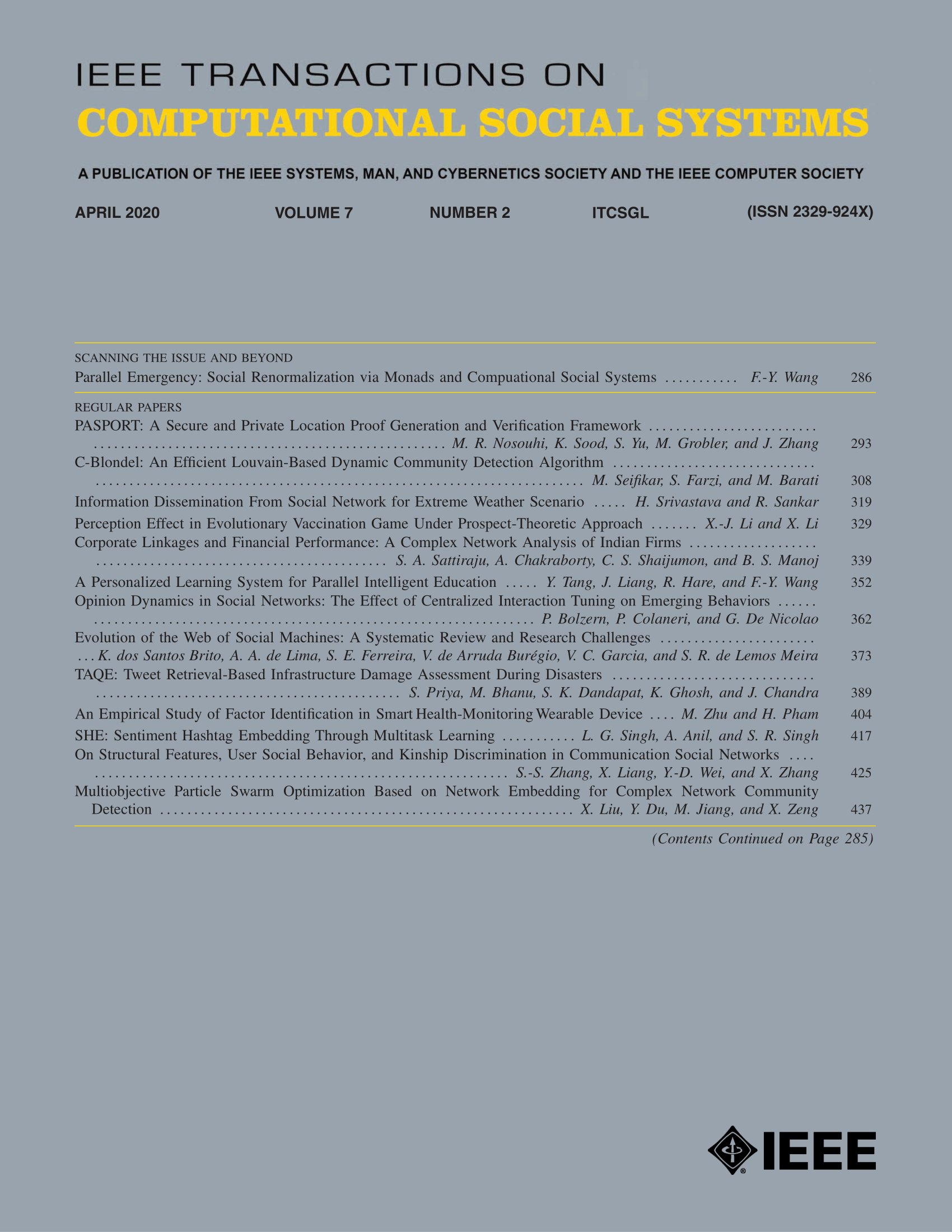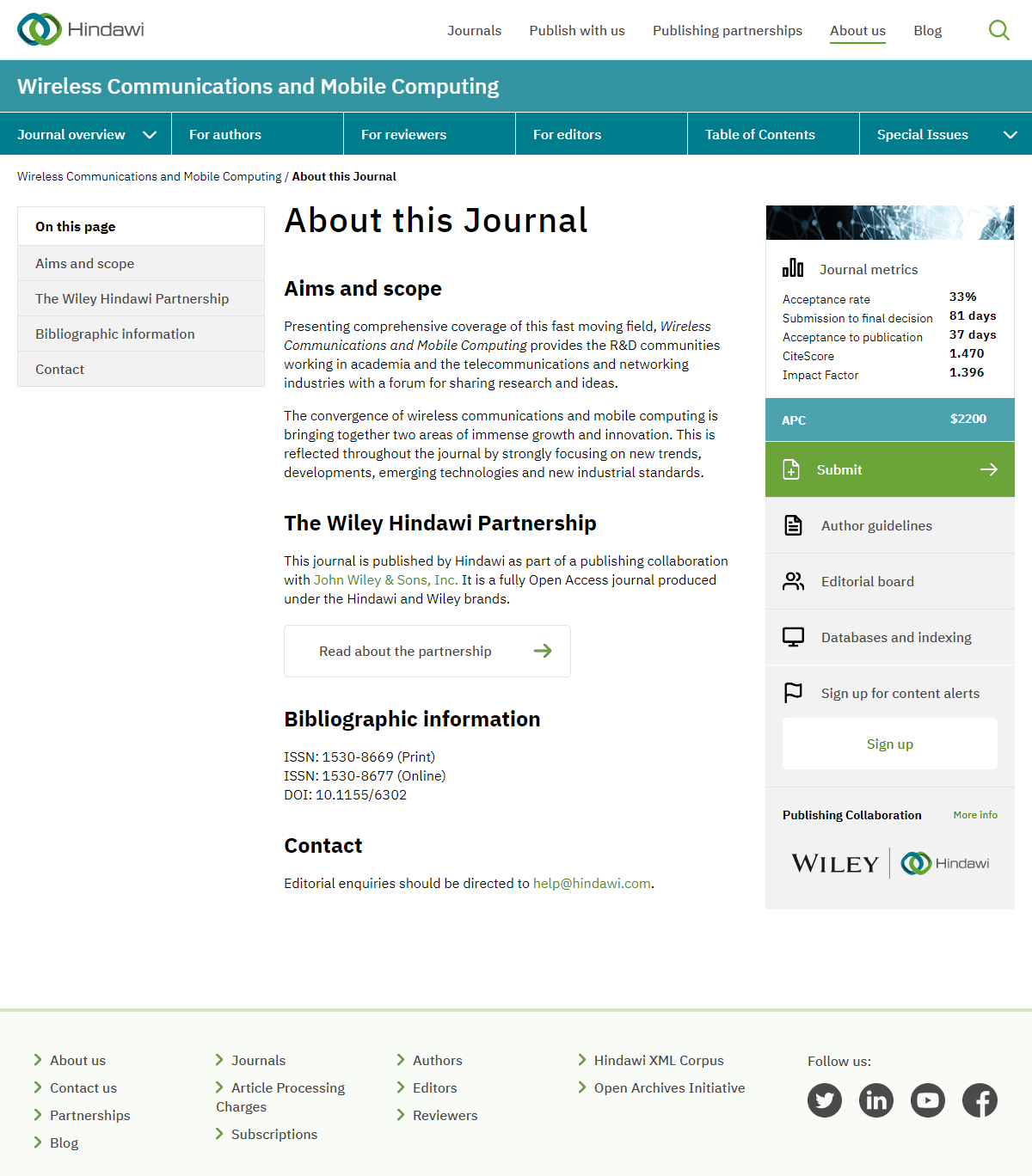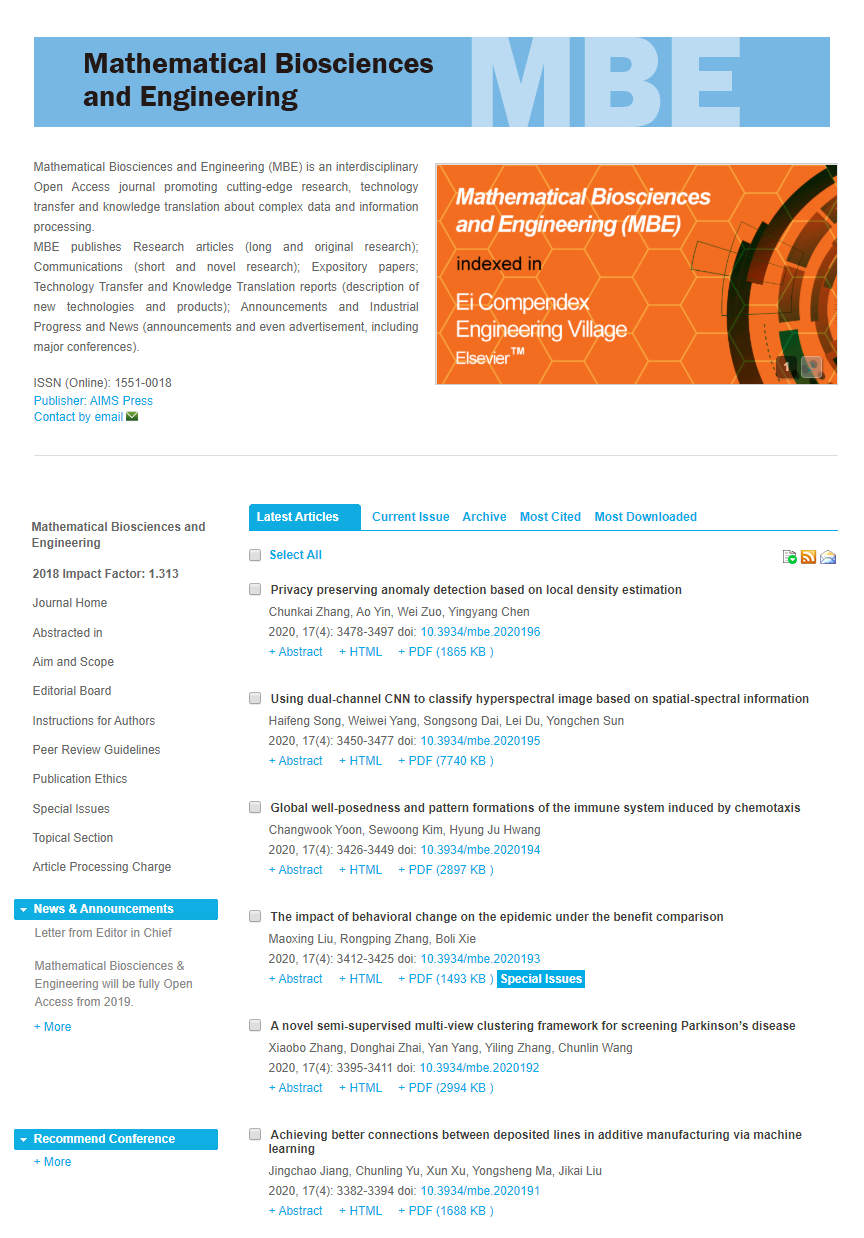NOTE: The recommended conference papers to the special issues of the following journals should undergo another quick review before accepted by the journals.

IEEE Internet of Things Journal
CALL FOR PAPER
for Special Issue on
Towards Intelligent Internet of Medical Things and Its COVID-19 Applications and Beyond
The Internet of Medical Things(IoMT) is an extension and specialization of that original Internet of Things(IoT) concept, and applies to the interconnectedness of devices, software applications, and data which are specific to the medical industry. IoMT can add smart technologies to medical devices to monitor the progression of a disease away from the doctor’s office and learn things that could impact future care guidelines and patients. It can also provide a better way to care for our elderly by tracking vitals and heart performance, glucose and other body systems, and activity and sleeping levels. During outbreak of pandemic(e.g. COVID-19), IoMT can even be used to detect main symptoms ubiquitously using intelligent sensors and trace the origin of outbreak based on aggregated IoT data (e.g., geographic mobile data, purchase history). Although most of contemporary IoMT systems can measure risks, make decisions and take actions automatically,the lack of Emotion-Aware abilities will be an obstacle to more harmonious human-machine interaction and more efficient medical process. Besides, mental disorders, such as depression, schizophrenia and anxiety, have become a more noticeable cause of suffering. The integration of Emotion-Aware abilities into IoMT can also contribute to monitor emotional dysregulation continuously in subjects with mental disorders or undergoing serious pandemic such as COVID-19, and give these patients personalized therapy recommendations. Research on Affective computing has defined a framework to recognize, interpret and process human affects, but more research is needed to investigate its application to biomedical applications, especially “in the wild” and over extended periods of time, and how to integrate Emotion-Aware abilities into IoMT organically is still an open question. This special issue aims to create a platform for researchers, developers and practitioners from both academia and industry to disseminate the state-of-the-art results and to advance the Emotion-Aware Ubiquitous Computing in IoMT.
Important Dates:
Submission Deadline: October 15, 2020
First Review Due: December 30, 2020
Revision Due: February 15, 2021
Sec. Reviews Due/Notification: March 15, 2021
Final Manuscript Due: March 31, 2021
Publication Date: 2021

IEEE Transactions on Computational Social Systems
CALL FOR PAPER
for Special Issue on
Collaborative Edge Computing for Social Internet of Things Systems
The emerging applications for smart cities intend to promote the quality of citizens' life. Among them, ubiquitous user connectivity and real-time computation offloading are significant for the ever-increasing requirements of delay-sensitive and mission-critical applications. By integrating human social behaviors (such as relationship, similarity, community, social ties) with physical Internet of Things (IoT) systems, social IoT systems are promising to provide ubiquitous connectivity among users. As the applications of social IoT systems are transferring from information dissemination to user entertainment (such as image identification, online games, augmented reality), computation offloading is significant to reduce the execution delay of applications.
The proliferation of IoT pushes the horizon of edge computing. Since social features and connections among users are significant for both IoT systems and computation offloading, this specific issue focuses on Collaborative Edge Computing (CEC) in social IoT systems. However, it is rather challenging to perform CEC for social IoT systems because of network heterogeneity, user privacy, user selfishness and so on. Besides, different users and individuals may be interested in various kinds of information, distinct user requirement may require different task processing abilities, and spatio-temporal distribution character challenges the cooperation of IoT users. Consequently, novel design principles are advocated for CEC in social IoT systems.
Important Date (tentative):
First submission deadline: October 30, 2020
Notification of first decision: December 30, 2020
Revision submission deadline: February 20, 2021
Notification of final decision: March 15, 2021
Final manuscript (camera ready) submission deadline: March 30, 2021
Issue of Publication: Decided by the EiC

Wireless Communications and Mobile Computing
CALL FOR PAPER
for Special Issue on
Deep Feature Learning for Big Data
The rapid growth of data has brought valuable resources to many industries, and at the same time has brought severe challenges to many fields. The effective use of feature learning technology can discover the hidden rules in big data and tap the potential value of big data, thereby predicting future development, which will greatly promote the overall development of the global economy and society.
As a typical technique of feature learning, deep learning employs supervised or unsupervised strategies to automatically learn multi-layer representations of data and has been successfully applied to the fields of speech recognition, collaborative filtering, and image processing. Although deep learning has made some progress in data feature learning, it still faces many scientific challenges. For example, when the data have the characteristics of inaccuracy, incompleteness, imbalance, etc., the learning results of the algorithms and models will be seriously affected.
Therefore, this Special Issue aims to seek high-quality papers from academics and industry-related researchers of big data, machine learning, and artificial intelligence, who conduct research on the shortcomings of deep learning models in big data feature learning and present the most recently advanced methods and applications.
Important Dates:
Submission Deadline: 25 Sep 2020
Publication Date: 01 Feb 2021

Mathematical Biosciences and Engineering
CALL FOR PAPER
for Special Issue on
Learning based Computational Bioinformatics for Healthcare Big Data
The rapid growth of data has brought valuable resources to many areas, and at the same time has brought severe challenges to many fields, such as bioinformatics. The effective use of machine learning technology can discover the hidden rules in big data and tap the potential value of big data, thereby predicting future development, which will greatly promote the overall development of the global economy and society. As a typical technique of machine learning, deep learning employs supervised or unsupervised strategies to automatically learn multi-layer representations of data, and has been successfully applied to the fields of speech recognition, collaborative filtering, and image processing. Although deep learning has made some progress in data feature learning, it still faces many scientific challenges in bioinformatics for healthcare. For example, when the data have the characteristics of inaccuracy, incompleteness, imbalance, etc., the learning results of the algorithms and models will be seriously affected. Therefore, this special issue aims to seek the high-quality papers from academics and industry-related researchers of healthcare big data, computational bioinformatics and machine learning, which conducts research on the shortcomings of learning models for healthcare big data in bioinformatics and present the most recently advanced methods and applications.
Important Dates:
The deadline for manuscript submission is November 30th, 2020.


